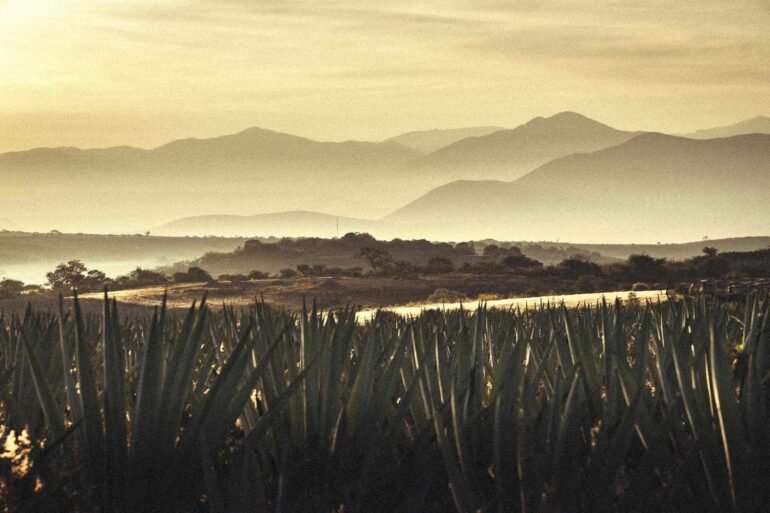:max_bytes(150000):strip_icc():format(jpeg)/Destilado-de-Agave-FT-DGTL1025-Paquera-Mezcal-04-7ba6f763ce0a49c2b42916af137cee19.jpg)
Those immersed in the world of tequila, mezcal, and other Mexican agave spirits might have noticed a small selection of bottles on back bars and store shelves that aren’t labeled as any specific type of agave spirit.
When “destilado de agave” is displayed on a label, it simply means the spirit is distilled from agave. It also means that it doesn’t meet the legal criteria to be labeled as tequila, mezcal, or other established spirit.
“That label doesn’t mean the product is inferior,” says Jon-Paul Fortunati, CEO of Cazcanes Tequila. “In many cases, it means the producer made a conscious choice to preserve traditional methods or avoid industrial shortcuts. These spirits can offer incredible flavor and cultural value.”
Mostly represented by small producers and niche importers, destilados de agave are coming to the U.S. with the help of more established brands. Recently, Paquera Mezcal released two uncertified agave spirits from Oaxaca made by different producers.
Cazcanes, a popular tequila brand, released Nuestra Raíces, an uncertified, Blue Weber agave spirit from Jalisco. Meanwhile, Caballito Cerrero has quietly become among the premier purveyors of uncertified agave distillates from the heart of Jalisco’s Tequila Valley.
Why does this matter? Hunting down destilados de agave might be the best way to find the world’s most exciting, interesting, and delicious agave spirits.
“Today, a significant share of the best agave spirits are uncertified, part of a quiet rebellion against the system,” says Max Reis, beverage manager at Mírate and Daisy Margarita Bar in Los Angeles. Among the country’s best agave bars, the rise of destilados de agave is undeniable. “On my own back bar, for example, only two of our over 75 agave spirits are certified.”
Courtesy of Mezcal Amarás
What are “destilados de agave”?
“Destilado de agave” simply means agave distillate, broadly any distilled spirit made from cooked and fermented agave. Specifically, it refers to any agave spirit that doesn’t adhere to the labeling rules of the Norma Oficial Mexicana (NOM).
The world of Mexican agave spirits is incredibly complex, and it often doesn’t necessarily fit into neat or concise parameters. “In the case of mezcal, it is even more diverse due to the vast number of agave varieties, the unique traditions each community has for producing it, and the microclimates in every mezcal-producing region,” says Diana Orozco Cruz, maestra mezcalera for Mezcal Amarás. “But all of them share a common trait: offering the consumer unique flavors and processes full of magic.”
“Regulation exists to protect tequila and mezcal, but it cannot capture all the diversity of traditions across Mexico,” says Don Fortino Ramos, maestro mezcalero of 40 years and shareholder in The Lost Explorer mezcal. “What matters most is transparency: knowing who made the spirit, how it was crafted, and the values guiding that work.”
Courtesy of Erik Orlando / Paquera Mezcal
Why do some producers choose not to certify?
While certification is still relatively new to agave spirits when compared to other denominations of origin, it’s widely adopted by producers throughout Mexico. It’s much easier to sell a product guaranteed to be safe and with name recognition abroad.
Increasingly, though, small producers are not seeking certification for reasons as diverse as the people who grow and distill the agave, reasons both pragmatic and romantic. The surging interest in agave spirits allows an audience to mezcaleros and mezcaleras who could never get certified.
“[There are] difficulties for small-scale producers due to costs that not everyone can cover, in addition to the distance to the factories and favoritism toward certain companies that do business with each other through the same certification bodies,” says Teodolo Vasquez. Along with his siblings, he crafts a traditionally made spirit distilled from Arroqueño, bottled by Paquera.
Many such distilleries are extremely remote, especially those in the mountainous regions of Oaxaca. From the Consejo Regulador de Mezcal (CRM) base in Oaxaca City, it can take hours of driving through narrow, unpaved mountain roads to reach a single palenque.
Education and language barriers are also issues for some producers. Spanish is a second language for a significant portion of traditional distillers, many of whom grew up speaking one of Oaxaca’s many indigenous languages like Zapotec, Mixtec, and Mixe.
Don Fortino Ramos
“For many mezcaleros and mezcaleras, mezcal is the inheritance of tradition from our families and communities. Some choose to remain outside of certification as an act of independence, preserving the voice of their ancestors in every sip, while others continue to produce for their local communities.”
— Don Fortino Ramos
“The certification process is too difficult for older producers or those without at least a high school education, so they can’t complete the process themselves,” says Hafid Rodriguez, who produces a distillate for Paquera made from cuishe agave.
For many distillers, to eschew certification is more a personal than logistical decision. Many seek to preserve traditional production practices not recognized by the NOM.
“The goal isn’t to bypass certification,” says Fortunati. “It’s to preserve a style of agave spirit that predates it. By using wider cuts and mostly traditional tools, we’re able to highlight flavors and techniques that would otherwise be lost.”
“For many mezcaleros and mezcaleras, mezcal is the inheritance of tradition from our families and communities,” says Ramos. “Some choose to remain outside of certification as an act of independence, preserving the voice of their ancestors in every sip, while others continue to produce for their local communities.”
Courtesy of Mezcal Amarás
What does this mean for consumers?
While the most thoughtful and intentional agave-focused bar programs treat destilados de agave with the same respect they would a certified product, differences in production can lead to different flavor profiles.
“Producers of destilados aren’t restricted by the same chemical limits,” says Fortunati. “Certified producers must stay within narrow thresholds for methanol, aldehydes, and higher alcohols. These compounds are also regulated in other spirits categories, but tequila’s thresholds are far more restrictive.”
In the right amounts, those compounds add expressive flavors and aromas that can give a destilado a funky complexity with vegetal, floral, and sometimes fruity qualities.
“Many aren’t diluted with water, resulting in a richer mouthfeel,” says Reis. “These spirits aren’t always made for mass-market appeal. They’re crafted for people who understand and value the nuance of mezcal. In many cases, they’re the highest-quality spirits available.”
To fully appreciate a destilado de agave, it’s important to know who crafted it, where and how it was made, and why it was produced in that way. Understanding these things connects the drinker with those who create it.
“I believe there is an aspect that doesn’t speak about the product itself, but rather tells its story, one that the supplier should know, such as the hands that craft it and the minds that create what we enjoy in a sip of distilled spirit,” says Orozco Cruz.
Agave enthusiasts can enjoy some of the most complex and expressive spirits distilled in Mexico while preserving the centuries of traditions that helped create them.
“Consumers have more power than they realize,” says Reis. “The choices they make — what they support, what they ask about — directly shape the future of agave spirits. Scaling does not equal quality. In fact, in this category, scale often erases authenticity.”
Dylan Ettinger
2025-10-03 15:29:00

